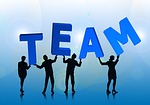Understand the real business model? You may not have heard the whole story.
“The best-run companies start with their people, trusting them as human beings and trusting their capability and their potential. In essence, ‘they are people sensitive.’ They understand the importance of training your people well and letting them do their jobs.”
To be “people sensitive” starts with individual attitudes.
The process of educational improvement begins in the minds of those that desire to do what is best for the nation’s children. It requires being open-minded and cooperative.
And there are some business model rules we might do well to follow. “We must learn not to tamper with success,” not in practice and not in policy.
We need to remember that most school districts in this country have settled the question of what to teach and how to best go about it. So in the 43rd Annual Phi Delta Kappa International (PDK)/Gallup poll on education, we shouldn’t be surprised that 71 percent of Americans say they…
“have trust and confidence in the men and women who are teaching in public schools.”
And that poll titled “Betting on Teachers,” also found 73 percent of Americans preferred education policies that “give teachers flexibility to teach in ways they think best” over those that “require teachers to follow a prescribed curriculum so all students can learn the same content” (Bushaw).
For immediate impact in the schools that need our help, we need to look at “the people side of schooling.” And if we believe that “organizational management should be based on observing problems from the bottom up and not from the top down” then isn’t it the teacher in the classroom and the family at home that should be managing the education of public school children?
Can a business model serve us well?
In any given classroom, the teacher becomes their own manager. They plan the lesson, guide the students, and evaluate themselves and their students. And as the business model points out,
“The highest form of self-management is intrapreneurship” and “if teachers are to become intrapreneurs, “they must be given the freedom to act on their own.”
“To achieve excellence, one focuses not on the mission, but on the culture.”
And it is “freedom factors” that “are the foundation for enabling school people to satisfy their higher-level needs. Only when we are able to produce a school environment that meets these needs will we be able to achieve excellence.” This is not what we have created with a test-based, competitive culture. And parents that are out to “give their child every advantage” have added fuel to the fire of competition while modeling a culture of selfishness for their own children.
But now ask yourselves — if training of teachers and leaders is the key to success, who is doing the training? Who set the standards for professional development? What principles are they based on? Are those in charge following the will of the people? Did “they” move forward with “reforms” with our consent?
Excerpts taken from James Lewis, Jr., book Achieving Excellence in Our Schools…by Taking Lessons from America’s Best-Run Companies published by J.L Wilkerson Publishing Company in 1986.

